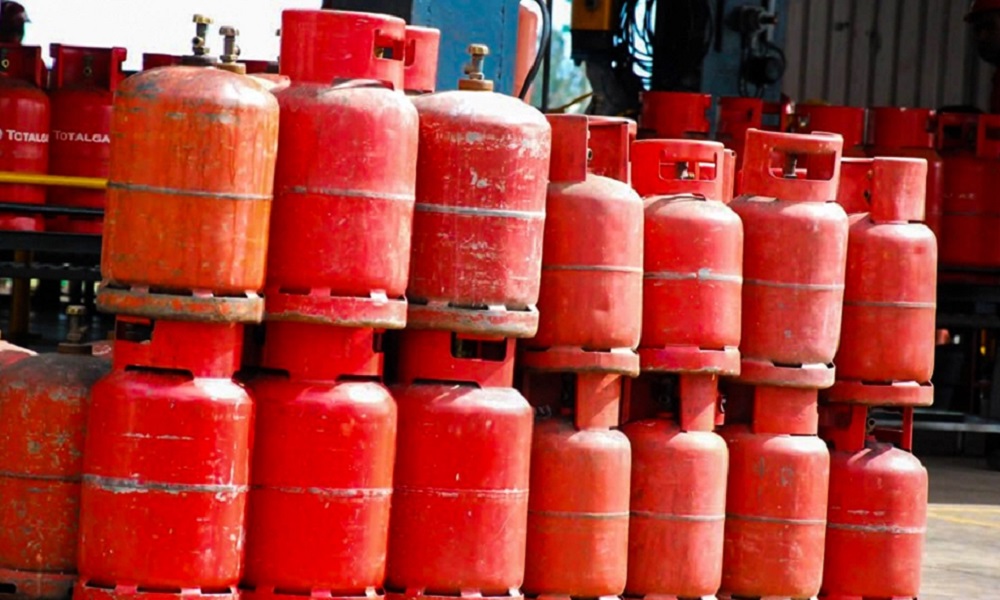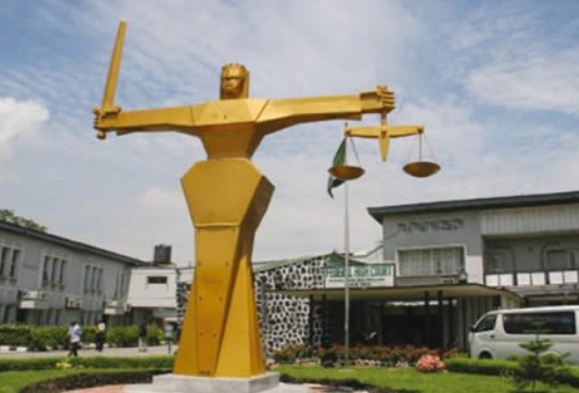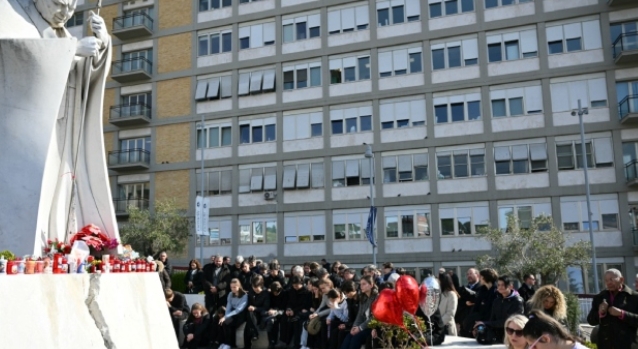News
Cooking gas price jumps to N1,500/kg

As Nigerians struggle with the high cost of petrol, the price of Liquefied Petroleum Gas, also known as cooking gas, has also increased to N1,500/kg.
But the Managing Director/Chief Executive Officer of NIPCO Plc, Suresh Kumar, said the Dangote refinery and other domestic refineries would bring down the price of cooking gas, expressing concerns that over 60 per cent of cooking gas consumed in Nigeria is being imported.
Checks by our correspondent confirmed that the prices of cooking gas peaked at N1,500/kg in some retail outlets in Ogun and Lagos States as of Sunday.
In Abuja, the average price for refilling a 12.5kg cylinder of cooking gas has increased by 41.6 per cent to N17,000 in different areas.
The PUNCH reports that the same commodity sold for N12,000 in July and N11,735 in January 2024.
This sharp price rise reflects ongoing trends in the market and may have implications for consumers, many of whom rely on LPG for their daily cooking needs.
In August, the Minister of State for Petroleum Resources (Gas), Ekperikpe Ekpo, promised to ensure a reduction in the rising cost of a kilogram of cooking gas.
Ekpo noted that he would invite the regulators and the gas producers to find ways to bring down the cost.
However, a new market survey conducted by our correspondent on Sunday revealed that the price has not decreased; instead, it has risen even further.
An analysis showed that the product currently sells for N17,000 in Lokogoma area of the FCT, an increase of 41.6 per cent from N12,000 vendors sold to customers three months ago. This means one kilogram of gas was sold for N1,400.
In Kubwa, the product was sold between N16,200 and N16,500 from N12,000 previously charged. But in the outskirt area of Bwari, Kurudu and Jikwoyi, the product sold for N1,300.
Some major distributors still sell the product between N1,300 and N1,400 depending on the location.
The Commissioner for Environment in Ogun State, Ola Oresanya, once told one of our correspondents that many might resort to charcoal for cooking if the price of LPG continues to rise.
However, speaking at the just-concluded National Conference of the Nigerian Association of Liquefied Petroleum Gas Marketers 2024, held in Lagos, Kumar, revealed that local production of LPG remains inadequate, urging the Federal Government to encourage Chevron to convert more of its propane output into propane.
“Currently, less than 40 per cent of the 1.5 million metric tonnes consumed domestically is produced locally. This is why the government must encourage companies like Chevron to convert more of their propane output into butane, which is more suitable for domestic use,” he explained.
Responding to questions about the rising cost of LPG amid a blend of local and imported supply, the managing director expressed optimism that prices would decline as domestic production improves, especially as the local refineries source crude oil locally.
“With the Dangote refinery and other refineries now sourcing crude oil in local currency, the volume of LPG produced locally is expected to increase, which will, in turn, drive down the price of the commodity,” the MD explained.
He added, “There is hope that the reliance on imported LPG will decrease, which will positively influence the prices at which the product is sold domestically. Greater local production will make LPG more affordable since it reduces exposure to foreign exchange fluctuations and international pricing dynamics.”
According to him, boosting local production would attract further investments in pipelines, storage, and bottling facilities, as well as expand retail outlets and LPG depots across Nigeria.
“Our latest assessments show that the existing downstream infrastructure is capable of handling up to 5 million MT annually. This means we are ready to accommodate increased production from both associated and non-associated gas fields within the country,” the MD said.
He urged the government to introduce incentives to encourage investments in gas processing.
According to him, NIPCO, which has been operational since 2004, initially entered the industry as a marketer of white products (petroleum fuels).
He, however, emphasised that the company’s long-term vision has always been to become a leader in the marketing and distribution of LPG.
Kumar said, “Our strategy was driven by the fact that Nigeria has over 200 trillion cubic feet of gas reserves. We believe that the country’s gas consumption must be optimised through the promotion of both LPG for domestic use and CNG for the industrial and transportation sector.”
He further emphasised the company’s investments in infrastructure, noting that NIPCO has expanded its LPG operations significantly over the years.
“In 2008, we invested in an LPG facility in Apapa with a capacity of 5,000 metric tonnes. Today, that same facility has grown to over 20,000 metric tonnes, thanks to strategic partnerships with our subsidiaries.
“We have also deployed LPG tankers and established multiple stations across Nigeria to ensure easy access to cooking gas for households nationwide,” Kumar revealed.
He further explained that while LPG is essential for homes, CNG will play a key role in powering industries and transforming the transportation sector.
The managing director added, “At the time NIPCO entered the market, Nigeria’s domestic LPG consumption was around 50,000 metric tonnes annually,” he stated.
“However, the past 16 to 17 years have been a remarkable journey. Today, the market has grown from 50,000 MT to approximately 1.5 million MT per year.”
Despite the growth, Kumar pointed out that significant potential remains untapped, saying less than 60 per cent of Nigeria’s 200 million population has embraced the use of LPG.
“Our vision is to harness these opportunities and grow the country’s LPG consumption from 1.5 million MT to levels more appropriate for a population of over 200 million people.
“We must work with the Nigerian Midstream and Downstream Petroleum Regulatory Authority and other stakeholders to end gas flaring in the country. Substantial investments are needed to capture and process flared gas to increase domestic supply beyond the current 1.5 million MT to at least 5 million MT annually,” he stressed.
The NIPCO boss acknowledged that demand for LPG in Nigeria has been relatively stagnant due to the high cost of the product.
“The current high prices have limited consumption growth, but this situation is only temporary. With more players entering the gas processing sector, we anticipate a market correction soon,” he stated, believing that the market would stabilise in the long run.
He urged the Federal Government to support local refineries, including the Dangote Refinery, to boost domestic gas production.
“It is crucial for the government to back these refineries in their efforts to significantly increase LPG output. This will drive down retail prices and make the product more accessible to Nigerians,” he posited.
Credit: PUNCH
News
Court orders reinstatement of fired Lagos Assembly Clerk, Onafeko

By Kayode Sanni-Arewa
The National Industrial Court sitting in Lagos has ordered the reinstatement of the fired Clerk of the Lagos State House of Assembly, Olalekan Onafeko.
The order follows an ex parte application to the Court made by Onafeko through his counsel, Yusuf Nurudeen, in a case he filed against Lagos State Government, Lagos State Civil Service Commission, Lagos State House of Assembly Service Commission, The Speaker, Lagos State House of Assembly, Attorney-General of Lagos State and Mr. Ottun Babatunde.
Onafeko was the Clerk of the House before January 13 when Hon. Mudashiru Ajayi Obasa was removed as Speaker, with the then Deputy Speaker, Mojisola Lasbat Meranda elected as the new Speaker.
Obasa’s removal, a decision that sparked controversy within the Lagos House and the ruling All Progressives Congress (APC), also led to Onafeko losing his position, with Babatunde Ottun appointed as his acting replacement.
The claimant in the suit marked: NICN/LA/23/2025 sought for an interim injunction restraining the six defendants from parading any individual including Babatunde as the clerk pending the hearing of the motion on notice for Interlocutory injunction already filed in the suit.
Granting the application, Justice M. N. Esowe in an ex parte order directed that Babatunde should cease to parade himself as Clerk
Esowe ordered that that what was in place in terms of the person in the saddle of the Clerk Office prior to the crisis rocking the House of Assembly should now prevail.
“That both parties shall maintain the peace and status quo ante bellum until the motion on notice is heard and determined,” Esowe ordered.
The judge slated the hearing of the motion on notice for March 3, 2024.
News
Worldwide Prayers For ‘Critically’ Sick Pope Francis

By Kayode Sanni-Arewa
Pope Francis spent his tenth day in hospital Sunday as Catholics around the world prayed for his recovery, the day after the Vatican warned the 88-year-old’s condition was “critical”.
The Argentine pontiff, who is being treated for double pneumonia, suffered a prolonged asthma-style attack on Saturday and required blood transfusions for a low platelet count.
On Sunday morning the Holy See said “the night passed peacefully, the pope rested” — indicating no repeat of the crisis the previous day, Vatican sources said.
But Francis, who had part of a lung removed when he was a young man, is still receiving oxygen through a tube in his nostrils in the papal suite at Rome’s Gemelli hospital.
In a message published Sunday but written in the past few days, the Jesuit thanked hospital staff and said he had confidence in his treatment.
“I am confidently continuing my hospitalisation at the Gemelli Hospital, carrying on with the necessary treatment — and rest is also part of the therapy!” he said.
“I ask you to pray for me,” he concluded in the text published in lieu of his weekly Sunday Angelus, which he normally delivers from a window overlooking St Peter’s Square.
People pray at the feet of a statue of John Paul II outside the Gemelli hospital where Pope Francis is hospitalized for pneumonia in Rome on February 23, 2025. (Photo by Alberto PIZZOLI / AFP)
Francis, who has been head of the Catholic Church since 2013, was admitted on February 14 initially with bronchitis, but his condition has deteriorated since then.
In its evening update Saturday, the Vatican warned his “condition continues to be critical, therefore the pope is not out of danger”.
It said Francis was alert and “spent the day in an armchair even if he was suffering more than” the day before.
It said he had a “prolonged asthmatic respiratory crisis, which also required the application of high-flow oxygen”.
Daily blood tests also “showed thrombocytopenia, associated with anaemia, which required the administration of blood transfusions”, it added.
Thrombocytopenia is a condition that occurs when the platelet count in the blood is too low, which can cause trouble stopping bleeding.
Blood or platelet transfusions, delivered via an intravenous (IV) line, are given to people who are either bleeding heavily or at very high risk of bleeding, according to the US National Institutes of Health (NIH).
“The pope gets worse,” headlined Italy’s Corriere della Sera newspaper on Sunday, while La Repubblica described it as the “darkest day” at the Vatican.
Well-wishers have been leaving candles outside the Gemelli since Francis was admitted, and a special mass was planned for Sunday evening in Rome.
“I am praying for him, for his health, because he is a special person for all of us,” Italian teacher Ilde Zito told AFP at the hospital.
Prayers and messages of solidarity also came in from among the almost 1.4 billion Catholics across the globe, alongside other Christians and world leaders.
In the cathedral of Buenos Aires, where Francis was once archbishop, TV screens at the entrance showed images of then Jorge Bergoglio’s good works, and the priest held a special mass.
“He is strong, he has always been strong, but there is nature. I know he is very ill and old. I hope he recovers, but it makes me sad,” Hector Armando Diaz, 76, a retired sales clerk, told AFP there.
Across the world in Iraq’s northern city of Mosul, a former bastion of the Islamic State group that Francis visited in 2021, at least a dozen churches also held prayers for him.
“This is the least we can do to express our solidarity, love, and appreciation for this great person,” said university professor Adnan Hadi.
Mexico’s president, Claudia Sheinbaum, offered her hopes on social media for a speedy recovery for the “great humanist” Francis, the first pope from the Americas.
Francis’s continued hospitalisation has sparked huge concern about his health but also speculation about whether he might step down.
He has always left the door open to following his predecessor, Benedict XVI, who in 2013 became the first pope since the Middle Ages to resign.
But he has repeatedly said it was not the time.

The pope maintains a punishing work schedule. He carried out a mammoth 12-day tour to the Asia-Pacific in September, but has suffered increasing health issues.
He underwent colon surgery in 2021 and an operation for a hernia two years later. He is overweight and has constant hip and knee pain, which forces him to use a wheelchair.
AFP
News
Liverpool thrash Man City, Go 11 Points Clear

By Kayode Sanni-Arewa
Liverpool took a big step to winning the Premier League, crushing an uninspiring Manchester City in a showdown on Sunday.
Mohamed Salah stole the show, scoring one and providing an assist to send Liverpool 11 points clear at the top of the table although they have played a game more.
The Egyptian opened the scoring with his 30th goal of the season before setting up Dominik Szoboszlai to double the lead before half-time.
Just days after exiting the Champions League to Real Madrid, this was another sobering defeat for the dethroned English champions, who are now 20 points adrift of the leaders.
So often during Pep Guardiola’s glorious reign, Liverpool have come up just short in English football’s great rivalry of recent years.
However, their time to match Manchester United’s record of 20 English top-flight titles now appears just months away in Arne Slot’s first season in charge.
Arsenal’s shock 1-0 home defeat to West Ham on Saturday had eased the pressure on Liverpool, that had built after dropping points in two of their last three games at Everton and Aston Villa.
A trip to the Etihad has for so long been the stiffest test of all, but City’s defensive frailties were easily exposed and they also badly missed the presence of the injured Erling Haaland in attack.
Liverpool, by contrast, had their talisman fit and firing as Salah took his staggering tally this season to 25 goals and 16 assists in 27 Premier League appearances.
However, their time to match Manchester United’s record of 20 English top-flight titles now appears just months away in Arne Slot’s first season in charge.
Arsenal’s shock 1-0 home defeat to West Ham on Saturday had eased the pressure on Liverpool, that had built after dropping points in two of their last three games at Everton and Aston Villa.
A trip to the Etihad has for so long been the stiffest test of all, but City’s defensive frailties were easily exposed and they also badly missed the presence of the injured Erling Haaland in attack.
Liverpool, by contrast, had their talisman fit and firing as Salah took his staggering tally this season to 25 goals and 16 assists in 27 Premier League appearances.
The Egyptian fired the visitors in front on 14 minutes thanks to a brilliantly executed set-piece routine.
Alexis Mac Allister’s corner was flicked by Szoboszlai into Salah’s path and his shot deflected off Nathan Ake past the despairing dive of Ederson.
At the other end, City’s own Egyptian international showed his ability to finish, but Omar Marmoush had strayed offside before being played in by Phil Foden.
City winger Jeremy Doku was skipping past Trent Alexander-Arnold at will, yet the Belgian consistently failed to deliver a telling cross or shot.
Salah was not so forgiving as he raced onto a long ball over the top and teed up Szoboszlai to wrong-foot Ederson.
The final outcome could have been much more humiliating for City had Liverpool had been as accurate on the counter-attack after the break.
Curtis Jones had a third goal ruled out by a VAR review for offside after Szoboszlai just failed to time his run through the heart of the City defence.
Ederson was forced into a stunning save from Luis Diaz and only a brilliant last-ditch tackle from Abdukodir Khusanov denied Szoboszlai a second.
Marmoush scored a hat-trick in last weekend’s 4-0 win over Newcastle and remained a lively threat as he flashed another effort across the front of Alisson Becker’s goal.
But City lacked the end product to make nearly 70 percent possession count.
Despite an eighth league defeat of the season, Guardiola’s men remain in fourth and will be confident of securing their place in the Champions League next season with a top-five finish likely to be enough.
However, after an unprecedented run of four consecutive titles, City look like yesterday’s team with Liverpool now champions in waiting.
-

 Metro21 hours ago
Metro21 hours agoInsecurity! Gunmen invade church, slash pastor’s 2 fingers
-

 Metro21 hours ago
Metro21 hours agoFire engulfs MTN office in Oyo
-

 News7 hours ago
News7 hours agoBabangida’s Book is filled with distorted facts, collection of lies, says Dele Farotimi
-

 Foreign21 hours ago
Foreign21 hours agoPentagon set to sack 5400 staff as attack hits Trump’s downsizing plan
-

 News13 hours ago
News13 hours agoREVEALED! Gov Fubara Accused of Paying N4.8Bn Monthly to Ikenga Ugochinyere
-

 Metro21 hours ago
Metro21 hours agoDanger averted as police rescued six kids from collapsed building
-

 News7 hours ago
News7 hours agoNDPC Finally Secures NJI’s Support for Data Privacy Right in Nigeria
-

 News21 hours ago
News21 hours agoNSCDC, Tantita intensify joint efforts to combat oil theft in Niger Delta







